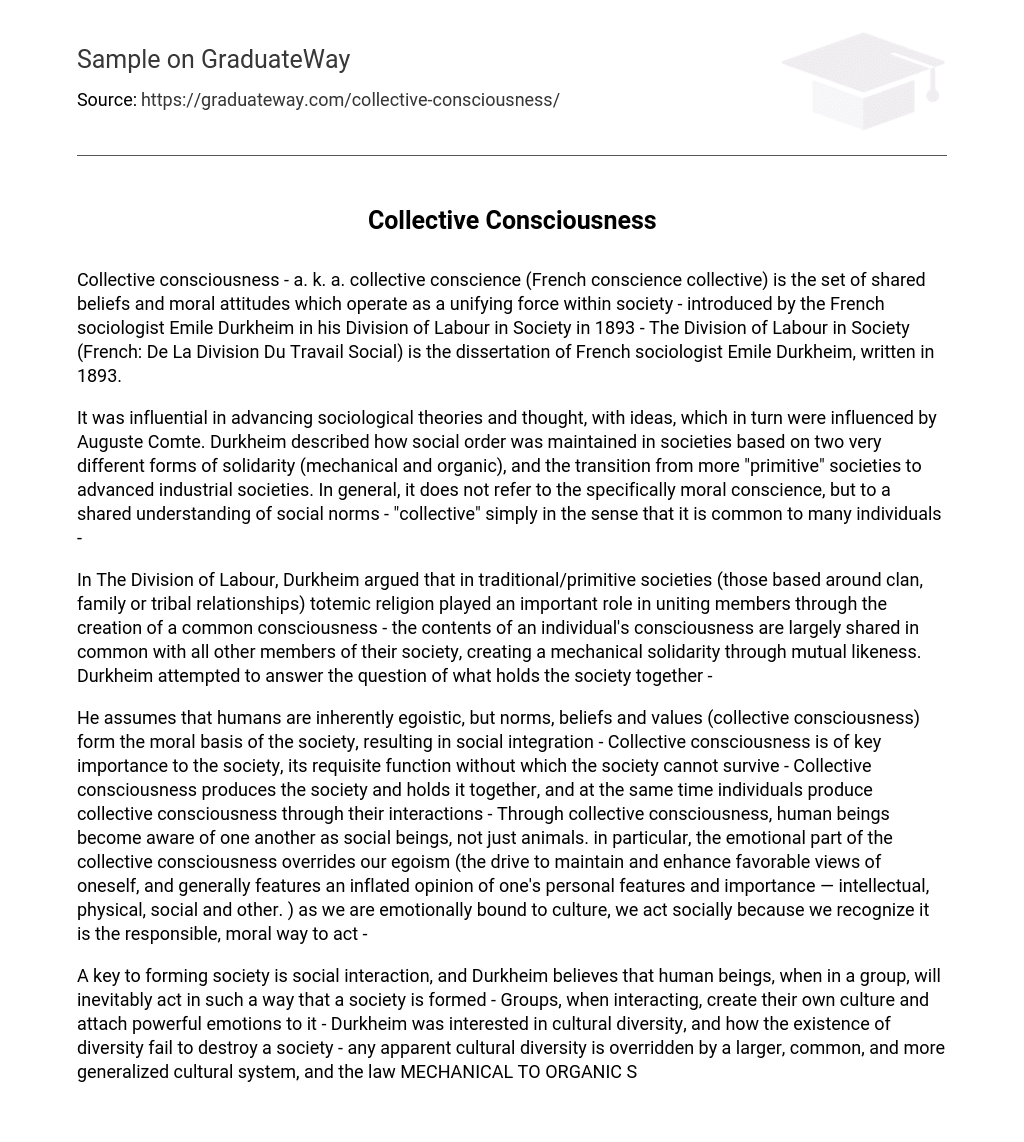Collective consciousness – a. k. a. collective conscience (French conscience collective) is the set of shared beliefs and moral attitudes which operate as a unifying force within society – introduced by the French sociologist Emile Durkheim in his Division of Labour in Society in 1893 – The Division of Labour in Society (French: De La Division Du Travail Social) is the dissertation of French sociologist Emile Durkheim, written in 1893.
It was influential in advancing sociological theories and thought, with ideas, which in turn were influenced by Auguste Comte. Durkheim described how social order was maintained in societies based on two very different forms of solidarity (mechanical and organic), and the transition from more “primitive” societies to advanced industrial societies. In general, it does not refer to the specifically moral conscience, but to a shared understanding of social norms – “collective” simply in the sense that it is common to many individuals –
In The Division of Labour, Durkheim argued that in traditional/primitive societies (those based around clan, family or tribal relationships) totemic religion played an important role in uniting members through the creation of a common consciousness – the contents of an individual’s consciousness are largely shared in common with all other members of their society, creating a mechanical solidarity through mutual likeness. Durkheim attempted to answer the question of what holds the society together –
He assumes that humans are inherently egoistic, but norms, beliefs and values (collective consciousness) form the moral basis of the society, resulting in social integration – Collective consciousness is of key importance to the society, its requisite function without which the society cannot survive – Collective consciousness produces the society and holds it together, and at the same time individuals produce collective consciousness through their interactions – Through collective consciousness, human beings become aware of one another as social beings, not just animals. in particular, the emotional part of the collective consciousness overrides our egoism (the drive to maintain and enhance favorable views of oneself, and generally features an inflated opinion of one’s personal features and importance — intellectual, physical, social and other. ) as we are emotionally bound to culture, we act socially because we recognize it is the responsible, moral way to act –
A key to forming society is social interaction, and Durkheim believes that human beings, when in a group, will inevitably act in such a way that a society is formed – Groups, when interacting, create their own culture and attach powerful emotions to it – Durkheim was interested in cultural diversity, and how the existence of diversity fail to destroy a society – any apparent cultural diversity is overridden by a larger, common, and more generalized cultural system, and the law MECHANICAL TO ORGANIC SOLIDARITY – Durkheim described the evolution of societies from mechanical solidarity to organic solidarity (one rising from mutual need) –
As the societies become more complex, evolving from mechanical to organic solidarity, the division of labor is counteracting and replacing collective consciousness – In the simpler societies people are connected to others due to personal ties and traditions – in the larger, modern society they are connected due to increased reliance on others with regard to them performing their specialized tasks needed for the modern, highly complex society to survive – In mechanical solidarity, people are self-sufficient, there is little integration and thus there is the need for use of force and repression to keep society together – In organic solidarity, people are much more integrated and interdependent and specialisation and cooperation is extensive –
One of the ways mechanical and organic societies differ is the function of law – in mechanical society the law is focused on its punitive aspect, and aims to reinforce the cohesion of the community, often by making the punishment public and extreme – whereas in the organic society the law focuses on repairing the damage done and is more focused on individuals than the community – Thus very far from there being the antagonism between the individual and society which is often claimed, moral individualism, the cult of the individual, is in fact the product of the society itself. It is the society that instituted it and made of man the god whose servant it is. —Emile Durkheim – One of the main features of the modern, organic society is the importance given to the concept – social fact – of the individual.
The individual, rather than the collective, becomes the focus of rights and responsibilities, the center of public and private rituals holding the society together – a function once performed by the religion – Durkheim saw the population density and growth as key factors in the evolution of the societies and advent of modernity. – As the number of people in a given area increase, so does the number of interactions, and the society becomes more complex. – Growing competition between the more numerous people also leads to further division of labor – In time, the importance of the state, the law and the individual increases, while that of the religion and moral solidarity decreases.





